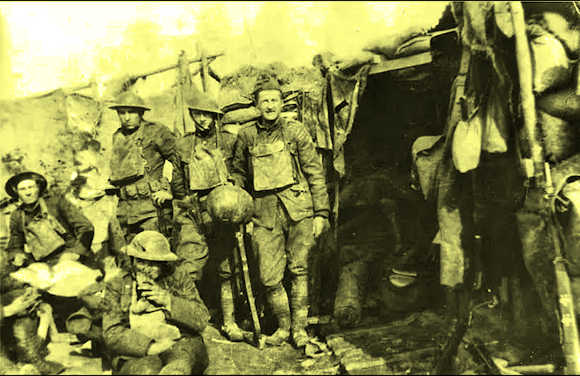Iowa, USA, and the Great War
Published: 3 March 2024
via the Roads to the Great War website

Soldiers of the 168th Infantry in France
Soldiers of the 168th Infantry in France. The 4,000-man 168th Infantry Regiment from the Iowa National Guard became part of the 42nd "Rainbow" Division. During the fighting in France, the 168th lost 700 killed and 3,100 wounded, nearly 100 percent casualties.
In the early 20th century, Iowa was an even more distinctly rural state that it is today. In the 1910 census out of a population of 2.2 million over 70 percent of Iowans lived on farms. Tellingly, the entire state only had about 300 miles of paved roads. When the United States declared war on Germany in April 1917, most Iowans supported the war effort enthusiastically. Patriotism for the United States and its allies was very strong. Its special geographic and demographic character, however, would affect its response to the coming hostilities.

An Iowa Farm Growing Multiple Crops Around the Time of the War
Needed: Soldiers
In time of war the nation needed soldiers. Some Iowa men volunteered for patriotic reasons, but the army still needed more men. The government required all men between the ages of 18 and 45 to register at the county courthouse. Each county was required to furnish a certain number of soldiers, called a “quota”. If the quota was not met by volunteers, young men who were physically able and capable of being soldiers were drafted. Anyone placed in the “Class 1” category was eligible for immediate induction. Others were “deferred” for a variety of reasons. They might work in “strategic occupations” such as farming and telegraph operations. They might have dependent relatives. Or they might have physical handicaps. There was a great amount of hostility, especially among farmers, who believed that money and political power could influence draft boards to offer deferments and exemptions. Of the 500,000 Iowa men registered for the draft, 54,147 served overseas, and 3,576 gave their lives.
The conscription possibility was especially hard on families of immigrant heritage whose ancestors had left Europe to avoid conscription there. There were many documented suicides, especially in rural areas, caused by the draft law. Conscientious objectors were subject to harassment and persecution, even if they came legally under the deferment or exemption categories. Quakers, Amish, Mennonites, Hussites, Seventh Day Adventists, and Russellites (which later became known as Jehovah’s Witnesses) all had religious doctrine against bearing arms.
Read the entire article on the Roads to the Great War website here:
External Web Site Notice: This page contains information directly presented from an external source. The terms and conditions of this page may not be the same as those of this website. Click here to read the full disclaimer notice for external web sites. Thank you.



